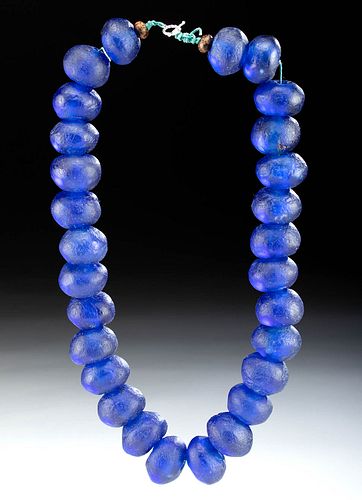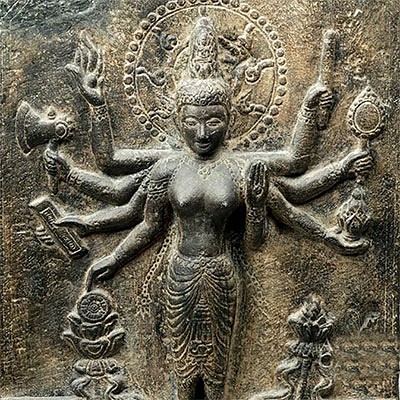19th C. African Glass Trade Bead Necklace - Cobalt Blue
Lot 185
About Seller
Artemis Fine Arts
686 S Taylor Ave, Ste 106
Louisville, CO 80027
United States
Selling antiquities, ancient and ethnographic art online since 1993, Artemis Gallery specializes in Classical Antiquities (Egyptian, Greek, Roman, Near Eastern), Asian, Pre-Columbian, African / Tribal / Oceanographic art. Our extensive inventory includes pottery, stone, metal, wood, glass and textil...Read more
Categories
Estimate:
$600 - $900
Absentee vs Live bid
Two ways to bid:
- Leave a max absentee bid and the platform will bid on your behalf up to your maximum bid during the live auction.
- Bid live during the auction and your bids will be submitted real-time to the auctioneer.
Bid Increments
| Price | Bid Increment |
|---|---|
| $0 | $25 |
| $300 | $50 |
| $1,000 | $100 |
| $2,000 | $250 |
| $5,000 | $500 |
| $10,000 | $1,000 |
| $20,000 | $2,500 |
| $50,000 | $5,000 |
| $100,000 | $10,000 |
| $200,000 | $20,000 |
About Auction
By Artemis Fine Arts
Feb 4, 2021
Set Reminder
2021-02-04 10:00:00
2021-02-04 10:00:00
America/New_York
Bidsquare
Bidsquare : CLEARANCE Asian | Antiquities | Ethnographic
https://www.bidsquare.com/auctions/artemis-gallery/clearance-asian-antiquities-ethnographic-6361
Featuring discounted pricing on Asian art, classical antiquities from Egypt, Greece, Italy, and the Near East...plus Pre-Columbian, Tribal, Russian Icons, Spanish Colonial, Fine Art, more! Starting prices have been reduced up to 65% from original auction prices - perfect for dealers and collectors! Artemis Fine Arts info@artemisfinearts.com
Featuring discounted pricing on Asian art, classical antiquities from Egypt, Greece, Italy, and the Near East...plus Pre-Columbian, Tribal, Russian Icons, Spanish Colonial, Fine Art, more! Starting prices have been reduced up to 65% from original auction prices - perfect for dealers and collectors! Artemis Fine Arts info@artemisfinearts.com
- Lot Description
**First Time At Auction**
West Africa, Ghana or Mali, likely originating in Western Europe, Netherlands, ca. 19th to early 20th century CE. A beautiful wearable necklace strung with 28 large glass trade beads of a deep cobalt hue. Each bead is made using a hot, arduous process by West African craftsman to form a spherical shape with a "sugary" textured surface. Trade beads played a significant role in the age of European exploration and colonization and served as currency pieces on multiple continents. The terminal strands are strung with small wood spacer beads and a silver plated loop and toggle clasp, which transforms these beads into a wearable piece! Size (necklace): 27" L (68.6 cm); (bead): 1.25" W (3.2 cm)
These beads were manufactured in molds and small kilns made from termite mounds lined with kaolin clay. Termite mound kilns could be fired at temperatures around 850-1000 degrees Farenheit, quite low for making glass - hence that "sugary" look! The beads were made by pouring powdered glass into the mold around a cassava stick, then heated for roughly an hour. They are rotated to make them round, so that each has a slightly unique shape. Finally, they are washed on a stone grinding slab to remove the kaolin clay and smooth the surface.
Provenance: private Boulder, Colorado, USA collection, acquired in 2018
All items legal to buy/sell under U.S. Statute covering cultural patrimony Code 2600, CHAPTER 14, and are guaranteed to be as described or your money back.
A Certificate of Authenticity will accompany all winning bids.
We ship worldwide and handle all shipping in-house for your convenience.
#161680Nicks and chips around openings. Stable hairline cracks and pitting. Wearable, strung in modern times.Condition
- Shipping Info
-
All shipping is handled in-house for your convenience. Your invoice from Artemis Gallery will include shipping calculation instructions. If in doubt, please inquire BEFORE bidding for estimated shipping costs for individual items.
-
- Buyer's Premium



 EUR
EUR CAD
CAD AUD
AUD GBP
GBP MXN
MXN HKD
HKD CNY
CNY MYR
MYR SEK
SEK SGD
SGD CHF
CHF THB
THB














